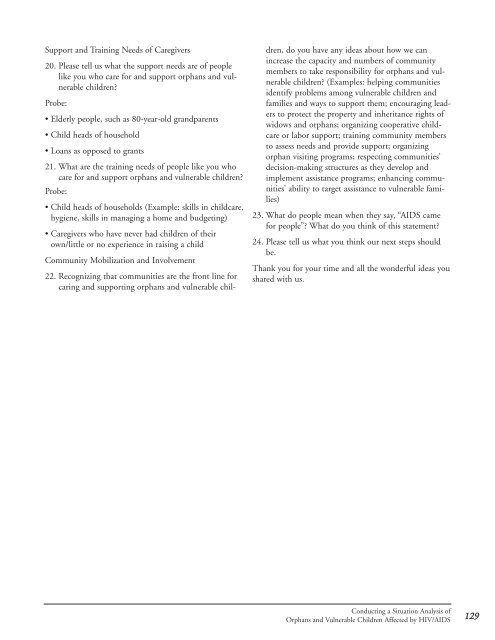Conducting a Participatory Situation Analysis of.pdf - Global HIV ...
Conducting a Participatory Situation Analysis of.pdf - Global HIV ...
Conducting a Participatory Situation Analysis of.pdf - Global HIV ...
Create successful ePaper yourself
Turn your PDF publications into a flip-book with our unique Google optimized e-Paper software.
Support and Training Needs <strong>of</strong> Caregivers<br />
20. Please tell us what the support needs are <strong>of</strong> people<br />
like you who care for and support orphans and vulnerable<br />
children?<br />
Probe:<br />
• Elderly people, such as 80-year-old grandparents<br />
• Child heads <strong>of</strong> household<br />
• Loans as opposed to grants<br />
21. What are the training needs <strong>of</strong> people like you who<br />
care for and support orphans and vulnerable children?<br />
Probe:<br />
• Child heads <strong>of</strong> households (Example: skills in childcare,<br />
hygiene, skills in managing a home and budgeting)<br />
• Caregivers who have never had children <strong>of</strong> their<br />
own/little or no experience in raising a child<br />
Community Mobilization and Involvement<br />
22. Recognizing that communities are the front line for<br />
caring and supporting orphans and vulnerable children,<br />
do you have any ideas about how we can<br />
increase the capacity and numbers <strong>of</strong> community<br />
members to take responsibility for orphans and vulnerable<br />
children? (Examples: helping communities<br />
identify problems among vulnerable children and<br />
families and ways to support them; encouraging leaders<br />
to protect the property and inheritance rights <strong>of</strong><br />
widows and orphans; organizing cooperative childcare<br />
or labor support; training community members<br />
to assess needs and provide support; organizing<br />
orphan visiting programs; respecting communities’<br />
decision-making structures as they develop and<br />
implement assistance programs; enhancing communities’<br />
ability to target assistance to vulnerable families)<br />
23. What do people mean when they say, “AIDS came<br />
for people”? What do you think <strong>of</strong> this statement?<br />
24. Please tell us what you think our next steps should<br />
be.<br />
Thank you for your time and all the wonderful ideas you<br />
shared with us.<br />
<strong>Conducting</strong> a <strong>Situation</strong> <strong>Analysis</strong> <strong>of</strong><br />
Orphans and Vulnerable Children Affected by <strong>HIV</strong>/AIDS<br />
129















